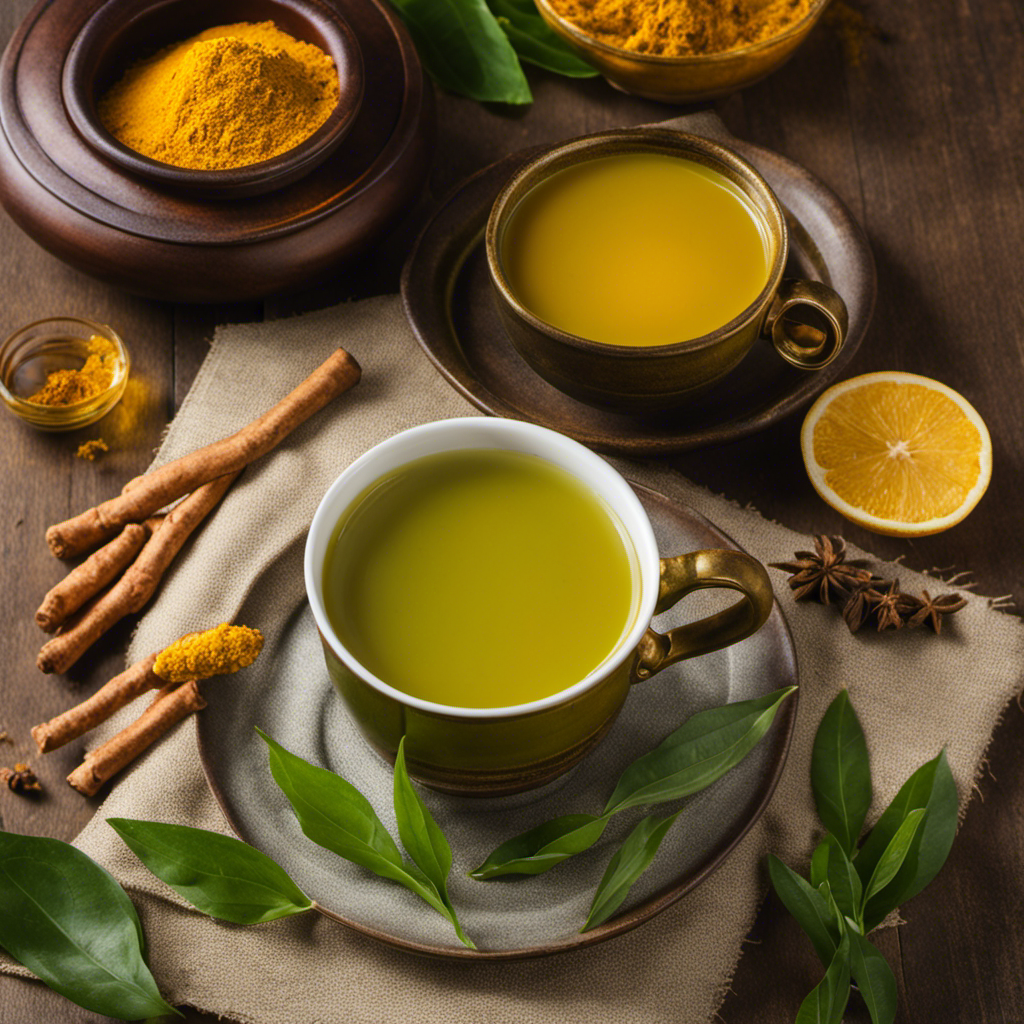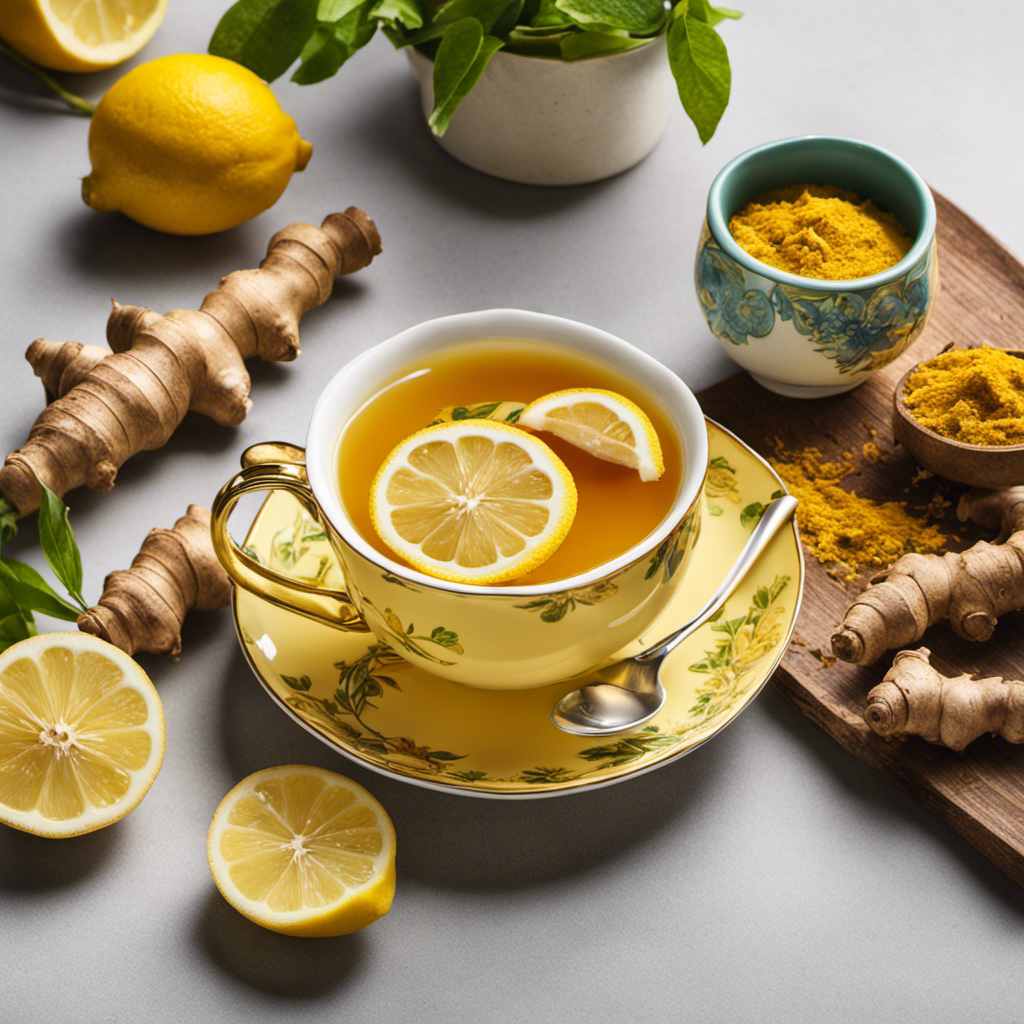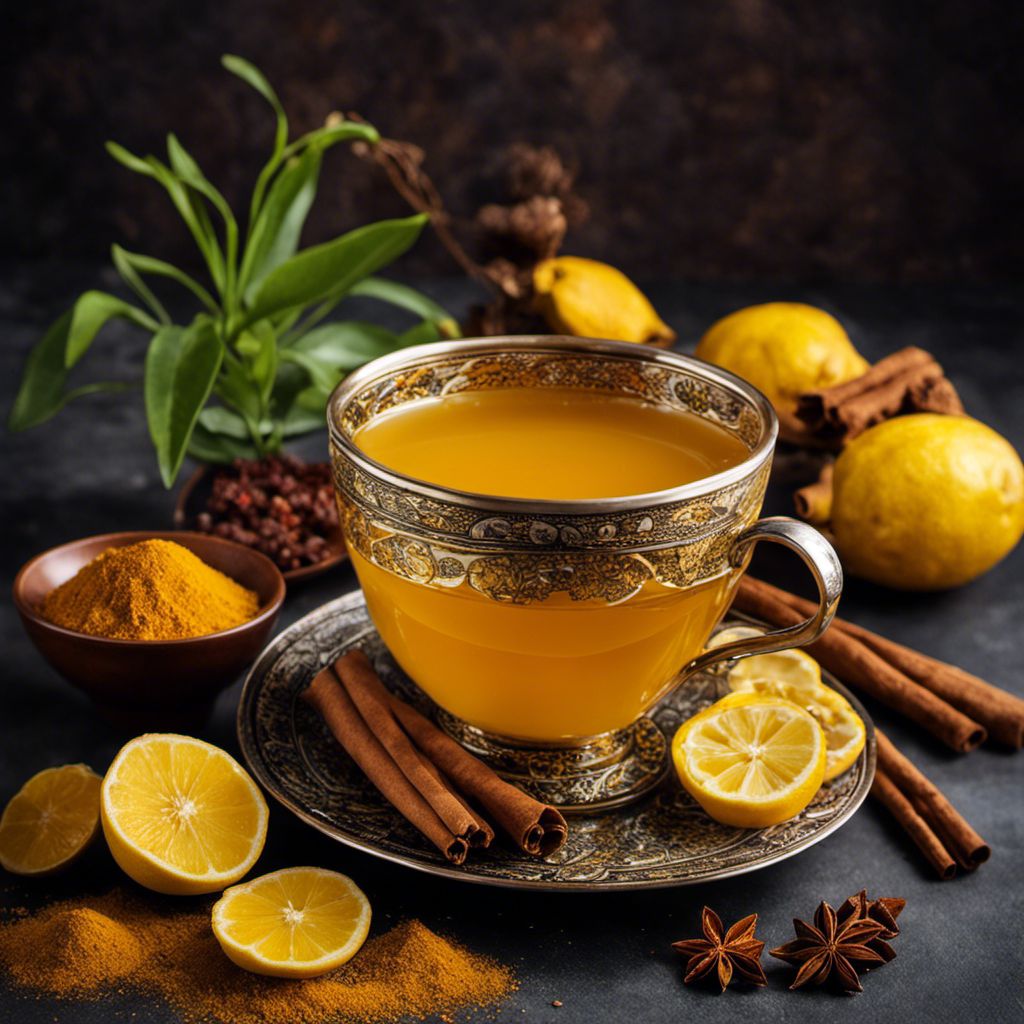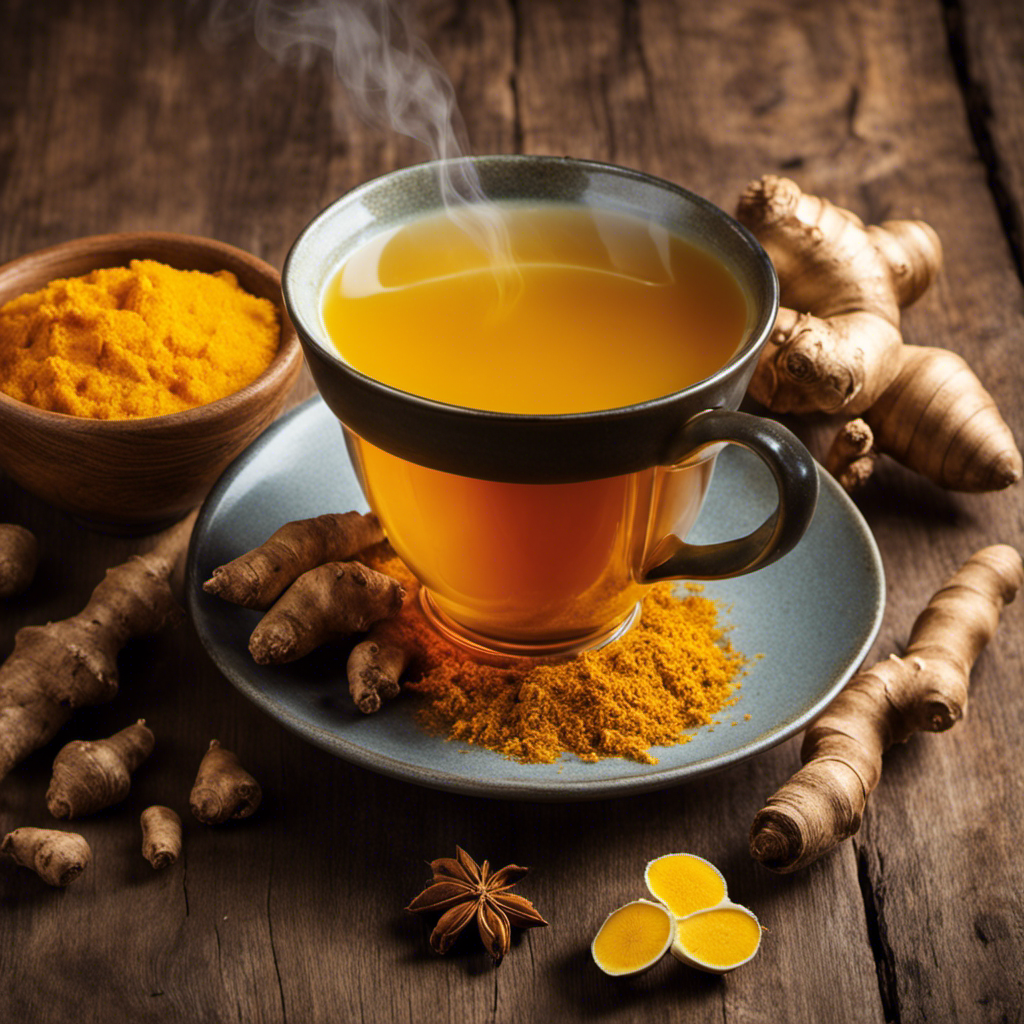Coffee Alternatives And Tea
The Battle Of Breakfast Teas: Irish Vs English

Get ready for the ultimate clash of morning brews! In the epic battle of breakfast teas, it’s the Irish versus the English, and the stakes couldn’t be higher. These two heavyweight contenders have been vying for the title of the perfect morning pick-me-up for centuries, each with its unique flavor profile and brewing techniques.
It’s a showdown like no other, where robustness and boldness go head to head in a quest to dominate your taste buds. Prepare to be captivated by the distinct flavors that define these iconic teas.
While the English breakfast tea boasts a blend of Assam and other strong black teas, its Irish counterpart takes it up a notch with a robust Assam component. But don’t be fooled, there’s more to these teas than their heritage. With a variety of black teas like Keemun, Kenyan, Ceylon, and Darjeeling, both teas have their own secret weapons to entice your senses.
But how do you brew the perfect cup? Fear not, dear reader, for I shall guide you through the art of tea-making. From preheating your mug to the precise steeping time, we’ll uncover the secrets to unlock the full potential of your breakfast tea. Whether you prefer a dash of milk or a sprinkle of sugar, this battle of breakfast teas is sure to awaken your senses and leave you craving for more.
So, grab your favorite mug and join me on this flavorful journey as we delve into the captivating world of Irish and English breakfast teas.
Key Takeaways
- Irish breakfast tea is usually stronger than English breakfast tea.
- English breakfast blends often contain 2 or more different teas, while Irish breakfast blends typically have 2 at most.
- Both English and Irish breakfast teas are made with strong black teas, but English breakfast tea is usually lighter.
- To brew breakfast teas, preheat the mug or teapot, use one teaspoon of tea leaves per cup of water, steep in boiling water for 3-5 minutes, and add milk and sugar.
Types of Breakfast Tea
I prefer Irish breakfast tea over English breakfast tea because of its robust flavor and stronger taste. Irish breakfast tea has a long history and origins rooted in Ireland, where it has become a staple in their tea culture. This bold tea blend is made predominantly with strong Assam tea, which gives it its rich flavor.
Not only does Irish breakfast tea provide a delightful taste experience, but it also offers numerous health benefits. Assam tea, the main ingredient in Irish breakfast tea, is known for its high levels of antioxidants and potential cardiovascular benefits. Additionally, the caffeine content in Irish breakfast tea can provide a natural energy boost to start the day.
Overall, Irish breakfast tea is a satisfying and invigorating choice, perfect for those who enjoy a stronger and more flavorful cup of tea.
Flavor Differences
Explore the distinct flavor profiles of each tea to provide a comprehensive comparison for tea enthusiasts.
-
Assam, commonly used in both English and Irish breakfast teas, offers a malty and robust flavor. Its dark liquor and rich taste make it the perfect base for a strong cup of tea.
-
On the other hand, Keemun, a key ingredient in traditional English breakfast tea, provides a lighter and smoother flavor. It has a hint of sweetness and a slightly floral note, adding complexity to the blend.
To enhance the flavor of breakfast teas, milk and sugar play a crucial role. The addition of milk helps to balance the strong tannins and bitterness, creating a creamier and smoother taste. Sugar, if desired, adds a touch of sweetness that can complement the bold and robust flavors of the tea.
By understanding the distinct flavor profiles and the role of milk and sugar, tea enthusiasts can choose the breakfast tea that best suits their preferences.
Brewing Tips
To achieve the perfect cup of breakfast tea, it’s important to follow these brewing tips. First, preheat your mug or teapot to ensure the tea stays warm for longer. Next, use one teaspoon of tea leaves per cup of water for a balanced flavor. Steep the tea in boiling water for 3-5 minutes, depending on your preference for strength. If you like a stronger cup, you can steep it for a bit longer. Now, let’s talk about milk and sugar options. Both English and Irish breakfast teas pair well with milk, which adds a creamy richness to the flavor. You can also add sugar to taste, if desired. Lastly, remember that there are different brewing methods, so feel free to experiment and find the one that suits your taste buds best.
| Brewing Tips | ||
|---|---|---|
| Preheat mug or teapot | 1 teaspoon of tea leaves per cup of water | Steep for 3-5 minutes |
| Experiment with brewing methods | Add milk for creaminess | Add sugar to taste |
Frequently Asked Questions
What is the history of breakfast teas?
Breakfast teas have a rich history and cultural significance. They originated with English breakfast tea, made with Chinese Keemun. Irish breakfast tea, stronger and robust, became popular later. Tea has played a vital role in societies throughout history.
Are there any health benefits associated with drinking breakfast teas?
There are several health benefits associated with drinking breakfast teas. They are rich in antioxidants, which can help protect against chronic diseases. However, it’s important to note that the caffeine content in these teas should be consumed in moderation.
Can breakfast teas be enjoyed without adding milk and sugar?
Breakfast teas can be enjoyed without milk and sugar, allowing the natural flavors of the tea to shine. Some popular alternatives include adding lemon or honey. The best brewing techniques include preheating the vessel and steeping for 3-5 minutes.
Are there any specific regions or countries known for producing high-quality breakfast teas?
Tea production in India, China, Kenya, Sri Lanka, United States, Australia, and Japan is known for high-quality breakfast teas. These regions offer a wide variety of flavors and blends, incorporating teas like Assam, Keemun, Ceylon, and Darjeeling.
Can breakfast teas be enjoyed at any time of the day or are they specifically meant for breakfast?
Breakfast teas can be enjoyed at any time of the day, not just in the morning. The flavors of breakfast teas, such as the robust and strong black teas, make them a great choice for tea lovers throughout the day. When it comes to the best tea brands for breakfast, it really depends on personal preference. Some popular brands known for their breakfast teas include Twinings, Taylors of Harrogate, and Barry’s Tea. These brands offer a wide range of flavor profiles and strengths to suit different tastes. So, whether you’re starting your day or looking for a pick-me-up later on, breakfast teas are a delicious and energizing option.
Conclusion
In conclusion, the battle of Irish and English breakfast teas is a longstanding rivalry steeped in tradition. While both teas offer a robust and flavorful experience, the key differences lie in their composition and brewing techniques.
Irish breakfast tea, with its strong Assam base and rich flavor, provides a hearty and invigorating start to the day. On the other hand, English breakfast tea, often made with Assam and Darjeeling, offers a more nuanced and balanced taste.
Whichever tea you choose, remember to preheat your mug or teapot, use the recommended amount of tea leaves, and steep in boiling water for the perfect cuppa. So, grab your favorite blend, add a splash of milk, and savor the warmth and comfort of a classic breakfast tea.
It’s time to indulge in a timeless tradition that transcends borders and brings joy to every sip. Cheers to the battle of breakfast teas, where every cup tells a story and every taste evokes nostalgia for a simpler time.
Noah, the Editor-in-Chief at Cappuccino Oracle, plays a pivotal role in shaping the voice and vision of our renowned platform. With an unwavering passion for coffee, coffee alternatives, and tea, Noah leads Cappuccino Oracle towards new horizons in the realm of coffee journalism.
Beyond his professional responsibilities, Noah serves as a mentor and guiding force for his team. His dedication to journalistic excellence and genuine love for coffee, coffee alternatives, and tea continue to inspire and motivate the Cappuccino Oracle family. In the ever-evolving world of these beverages, Noah’s leadership ensures that our platform remains at the forefront, delivering enlightening and enjoyable content to our readers worldwide.
Turmeric Tea
Vitamins in Turmeric Tea

I have always been intrigued by the effectiveness of natural remedies, and when I came across turmeric tea, I realized I had found something truly unique.
Little did I know, this golden elixir is not only packed with flavor but also loaded with essential vitamins.
In this article, we’ll explore the role of vitamin C, the benefits of vitamin B6, the vitamin K content, the importance of vitamin E, and the incredible combination of vitamin D and turmeric tea.
Get ready to unlock the secrets of these vitamins in turmeric tea and take your health to the next level.
Key Takeaways
- Vitamin C in turmeric tea boosts the immune system and enhances the absorption of curcumin.
- Vitamin B6 in turmeric tea supports brain health, boosts the immune system, and promotes heart health.
- Turmeric tea is a good source of vitamin K, which supports healthy bones, blood clotting, and provides antioxidant protection.
- Vitamin E in turmeric tea acts as a powerful antioxidant, reduces inflammation, and supports overall health and well-being.
The Role of Vitamin C in Turmeric Tea
Vitamin C plays a crucial role in boosting the immune system when consuming turmeric tea. The benefits of vitamin C in turmeric tea cannot be overstated. Vitamin C is known for its powerful antioxidant properties, which help protect the body against free radicals and oxidative stress. These antioxidants also enhance the absorption of turmeric’s active compound, curcumin, which has numerous health benefits.
Vitamin C also supports collagen production, aiding in skin health and wound healing. Furthermore, vitamin C strengthens the immune system by stimulating the production of white blood cells and enhancing their function. This, in turn, improves the body’s ability to fight off infections and diseases.
The impact of vitamin C on turmeric tea’s health benefits is undeniable, making it an essential nutrient to include in your daily diet.
Moving on to vitamin B6, another vital component of turmeric tea.
Vitamin B6 Benefits in Turmeric Tea
You’ll be glad to know that B6 benefits your body in many ways when you enjoy a cup of this golden elixir. Here are some of the benefits of vitamin B6 in turmeric tea:
-
Supports brain health: Vitamin B6 plays a crucial role in the production of neurotransmitters, such as serotonin and dopamine, which regulate mood and cognitive function.
-
Boosts immune system: Vitamin B6 helps in the production of antibodies and white blood cells, which are essential for a strong immune system.
-
Promotes heart health: Vitamin B6 helps in the metabolism of homocysteine, an amino acid that, when elevated, can increase the risk of heart disease.
While turmeric tea can provide a good source of vitamin B6, it is important to note that vitamin B6 deficiency is rare and can usually be prevented through a balanced diet.
Additionally, excessive supplementation of vitamin B6 can lead to potential side effects such as nerve damage, numbness, and tingling. It is always best to consult with a healthcare professional before considering any vitamin B6 supplementation.
Vitamin K Content in Turmeric Tea
The content of K in turmeric tea is worth noting as it contributes to maintaining healthy bones. Vitamin K is a fat-soluble vitamin that plays a crucial role in bone health and blood clotting. It is also known for its antioxidant properties, which help protect cells from damage caused by free radicals. Here is a table highlighting the importance of vitamin K in turmeric tea:
| Vitamin K Benefits in Turmeric Tea |
|---|
| Supports bone health |
| Aids in blood clotting |
| Provides antioxidant protection |
Including turmeric tea in your daily routine can be beneficial in ensuring an adequate intake of vitamin K. As we transition to discussing the importance of vitamin E in turmeric tea, it’s important to note that this vitamin also offers numerous health benefits.
Importance of Vitamin E in Turmeric Tea
Including turmeric tea in your daily routine can be beneficial in ensuring you get enough of the important vitamin E. This powerful antioxidant plays a crucial role in supporting overall health and well-being. Here are three reasons why vitamin E in turmeric tea is so important:
-
Antioxidant properties: Turmeric contains a compound called curcumin, which is known for its potent antioxidant effects. Vitamin E works synergistically with curcumin to neutralize harmful free radicals in the body, protecting cells from oxidative damage.
-
Anti-inflammatory effects: Turmeric tea is renowned for its anti-inflammatory properties, and vitamin E plays a key role in reducing inflammation. Studies have shown that vitamin E can help alleviate symptoms of inflammatory conditions such as arthritis and cardiovascular disease.
-
Skin health: Vitamin E is also beneficial for maintaining healthy skin. It helps in protecting the skin from UV damage, reducing the appearance of scars, and promoting overall skin health.
Incorporating turmeric tea into your daily routine can provide you with the antioxidant benefits of vitamin E and support your overall health and well-being.
Vitamin D and Turmeric Tea: A Powerful Combination
Combining vitamin D with turmeric tea can be a powerful way to boost your overall health and well-being. Vitamin D deficiency is a common problem, especially among those who spend most of their time indoors or live in areas with limited sunlight.
Turmeric tea, on the other hand, is known for its numerous health benefits, including its anti-inflammatory and antioxidant properties. By adding vitamin D to your turmeric tea routine, you can enhance its effects on your immune system, bone health, and mood regulation.
Studies have shown that vitamin D plays a crucial role in supporting the immune system and reducing the risk of chronic diseases. So, incorporating vitamin D into your turmeric tea regimen can provide you with a double dose of health benefits.
Conclusion
In conclusion, turmeric tea is a powerhouse of vitamins that can provide numerous health benefits.
From the immune-boosting properties of vitamin C to the mood-enhancing effects of vitamin B6, this golden elixir is a great addition to your daily routine.
The vitamin K content helps in maintaining healthy bones, while vitamin E acts as a potent antioxidant.
And when combined with vitamin D, turmeric tea becomes even more effective in promoting overall wellness.
As the saying goes, ‘An apple a day keeps the doctor away,’ but a cup of turmeric tea might just do the trick too!
Arf, an author and an innovative enthusiast of coffee, coffee alternatives, and tea, plays a crucial role as a contributor to the esteemed Cappuccino Oracle platform. Renowned for his curiosity and passion for these captivating beverages, Arf has carved out a unique space for himself in the world of exploration and writing. He realized that coffee, coffee alternatives, and tea are not mere drinks to keep one awake, but universes of flavors and stories waiting to be explored.
Arf’s articles for Cappuccino Oracle blend meticulous research with personal experiences, providing readers with an in-depth understanding of various types of coffee, coffee alternatives, and tea, along with their unique characteristics, cultures, and histories. His honest reviews and engaging narratives guide readers on their own journeys, helping them discover their preferences and find their perfect brew.
Turmeric Tea
Hyleys Turmeric With Green Tea Benefits

As a passionate tea enthusiast, I am constantly searching for new blends that provide a combination of flavor and health advantages. This is why I was fascinated when I came across Hyleys Turmeric with Green Tea.
This unique combination not only tantalizes the taste buds but also provides a plethora of health benefits. From boosting immunity to managing inflammation, supporting digestive health to promoting heart health, this blend is a powerhouse of wellness.
Join me as we explore the incredible benefits of Hyleys Turmeric with Green Tea.
Key Takeaways
- Hyleys Turmeric with Green Tea provides anti-aging benefits due to its rich antioxidants that neutralize free radicals and reduce oxidative stress.
- The blend of turmeric and green tea in Hyleys Turmeric with Green Tea promotes immune-boosting effects, enhancing the activity of immune cells and improving the immune system’s ability to fight off pathogens.
- Hyleys Turmeric with Green Tea aids in managing inflammation through the natural anti-inflammatory properties of turmeric’s curcumin and the antioxidants in green tea.
- This blend supports digestive health by soothing the digestive tract, reducing discomfort, and promoting the growth of beneficial bacteria in the gut. Additionally, it promotes heart health by reducing inflammation, lowering LDL cholesterol levels, and improving blood vessel function.
Health Benefits of Hyleys Turmeric With Green Tea
You’ll be amazed at the variety of health benefits you can experience from drinking Hyleys Turmeric with Green Tea. This powerful blend offers numerous anti-aging benefits and can aid in weight loss.
Turmeric is well-known for its anti-aging properties, thanks to its high concentration of antioxidants. These antioxidants help to neutralize free radicals in the body, reducing oxidative stress and preventing premature aging.
Green tea is also rich in antioxidants, which can help slow down the aging process and promote youthful skin. Additionally, the combination of turmeric and green tea has been found to support weight loss. Green tea helps to boost metabolism, increase fat oxidation, and reduce appetite, while turmeric aids in digestion and promotes a healthy gut. Together, these ingredients can support weight loss efforts.
Transitioning to the next section, let’s explore how Hyleys Turmeric with Green Tea can boost immunity.
Boosting Immunity With Hyleys Turmeric With Green Tea
To strengthen your immune system, try incorporating this powerful blend into your daily routine.
Hyleys Turmeric with Green Tea is packed with antioxidants and anti-inflammatory properties that can help boost your immunity.
Turmeric, the main ingredient in this blend, contains a compound called curcumin, which has been shown to have immune-boosting effects. Studies have found that curcumin can enhance the activity of immune cells and improve their ability to fight off pathogens.
Adding Hyleys Turmeric with Green Tea to your diet can be as easy as enjoying a cup of tea or incorporating it into your favorite recipes. If you prefer a more concentrated dose, turmeric supplements are also available.
Managing Inflammation With Hyleys Turmeric With Green Tea
If you’re looking for a natural way to manage inflammation, incorporating Hyleys Turmeric with Green Tea into your routine could be a great option.
Turmeric has long been used as a traditional remedy for its natural anti-inflammatory properties. The active component in turmeric, called curcumin, has been shown to have powerful effects in reducing joint pain and inflammation.
Green tea, on the other hand, is rich in antioxidants that can help protect the body against inflammation and oxidative stress.
When combined, turmeric and green tea create a powerful blend that can support the body’s natural ability to manage inflammation.
Supporting Digestive Health With Hyleys Turmeric With Green Tea
By incorporating Hyleys Turmeric with Green Tea into your routine, you can support your digestive health. This powerful combination of turmeric and green tea offers numerous benefits for your digestive system.
Turmeric contains curcumin, a compound known for its anti-inflammatory properties that can help soothe the digestive tract and reduce discomfort. Green tea is rich in antioxidants that promote a healthy gut by reducing inflammation and supporting the growth of beneficial bacteria.
Additionally, green tea has been shown to improve skin health and enhance brain function. It’s important to note that while Hyleys Turmeric with Green Tea can support digestive health, it is not a substitute for a balanced diet and healthy lifestyle.
In the next section, we will explore how Hyleys Turmeric with Green Tea can promote heart health.
Promoting Heart Health With Hyleys Turmeric With Green Tea
Incorporating Hyleys Turmeric with Green Tea into your routine can help support the health of your heart. Here are four ways in which turmeric and green tea can contribute to heart disease prevention and promote cardiovascular health:
-
Reduced inflammation: Turmeric contains a compound called curcumin, which has been shown to have anti-inflammatory properties. Chronic inflammation is known to contribute to heart disease, and by reducing inflammation, turmeric can help protect the heart.
-
Improved cholesterol levels: Green tea has been found to lower LDL cholesterol levels, also known as ‘bad’ cholesterol. High levels of LDL cholesterol can increase the risk of heart disease, and by incorporating green tea into your routine, you can help maintain healthy cholesterol levels.
-
Antioxidant protection: Both turmeric and green tea are rich in antioxidants, which help neutralize harmful free radicals in the body. Free radicals can cause oxidative stress, which can contribute to heart disease. By consuming turmeric and green tea, you can support your heart health by providing it with a powerful dose of antioxidants.
-
Enhanced blood vessel function: Turmeric and green tea have been shown to improve blood vessel function, promoting healthy blood flow and reducing the risk of cardiovascular problems. By incorporating these ingredients into your routine, you can help maintain optimal cardiovascular health.
Conclusion
In conclusion, Hyleys Turmeric with Green Tea is truly a golden elixir for overall health and wellness.
Just like a ray of sunshine piercing through the darkest storm clouds, this powerful blend of turmeric and green tea works wonders for our immunity, inflammation, digestion, and heart health.
With each sip, we are nourishing our bodies with the healing properties of nature, like a gentle breeze caressing our skin on a warm summer day.
So why not embrace this holistic treasure and let it guide us towards a healthier and happier life.
Arf, an author and an innovative enthusiast of coffee, coffee alternatives, and tea, plays a crucial role as a contributor to the esteemed Cappuccino Oracle platform. Renowned for his curiosity and passion for these captivating beverages, Arf has carved out a unique space for himself in the world of exploration and writing. He realized that coffee, coffee alternatives, and tea are not mere drinks to keep one awake, but universes of flavors and stories waiting to be explored.
Arf’s articles for Cappuccino Oracle blend meticulous research with personal experiences, providing readers with an in-depth understanding of various types of coffee, coffee alternatives, and tea, along with their unique characteristics, cultures, and histories. His honest reviews and engaging narratives guide readers on their own journeys, helping them discover their preferences and find their perfect brew.
Turmeric Tea
Ginger, Lemon, Turmeric Tea + Jamie Oliver

I have something special for you! If you’re searching for a drink that will revolutionize your beverage experience with its delightful taste and amazing health benefits, prepare to be amazed by ginger, lemon, and turmeric tea.
Trust me, this golden elixir is a game-changer. And guess what? Even the culinary guru himself, Jamie Oliver, has jumped on the bandwagon.
In this article, we’ll explore the wonders of this magical tea and discover Jamie’s unique take on it. Get ready to sip your way to better health!
Key Takeaways
- Ginger, lemon, and turmeric tea boosts the immune system and supports natural detoxification.
- Ginger has anti-inflammatory properties, while lemon strengthens the immune system and turmeric has antioxidant and anti-inflammatory effects.
- Jamie Oliver recommends blending ginger, lemon, and turmeric for flavor and health benefits.
- Variations and additions to the tea include mint, cinnamon, cardamom, cloves, and black pepper, which enhance the taste and provide additional health benefits.
Health Benefits of Ginger, Lemon, and Turmeric Tea
You’ll love the health benefits of ginger, lemon, and turmeric tea. This refreshing beverage is not only delicious, but it also has incredible immune-boosting properties and aids in natural detoxification.
Ginger, known for its anti-inflammatory properties, can help reduce inflammation in the body and support a healthy immune system.
Lemon, rich in vitamin C, is a powerful antioxidant and helps strengthen the immune system.
Turmeric, with its active compound curcumin, has been shown to have anti-inflammatory and antioxidant effects, contributing to overall health and well-being.
Combined, these ingredients create a potent tea that can help boost your immune system and promote natural detoxification.
Jamie Oliver’s Take on Ginger, Lemon, and Turmeric Tea
If you’re seeking a fresh take on blending zesty and aromatic ingredients, try incorporating Jamie Oliver’s recipe into your routine.
Jamie Oliver, a renowned chef and advocate for healthy eating, has his own recommended tea brewing method that combines the flavors of ginger, lemon, and turmeric.
These ingredients not only add a burst of flavor but also offer numerous health benefits. Ginger is known for its anti-inflammatory properties, lemon is rich in vitamin C and antioxidants, while turmeric contains curcumin, a compound with powerful antioxidant and anti-inflammatory effects.
Jamie Oliver’s favorite tea flavors include a combination of these ingredients, creating a delightful and invigorating beverage.
Remember, moderation is key when it comes to herbal remedies, as individual differences can play a role in how our bodies respond.
How to Make the Perfect Cup of Ginger, Lemon, and Turmeric Tea
To make the perfect cup of this invigorating beverage, simply blend zesty and aromatic ingredients according to Jamie Oliver’s recommended tea brewing method.
Ginger, lemon, and turmeric tea offers a myriad of health benefits. Ginger is known for its anti-inflammatory properties and can help with digestion and nausea. Lemon is packed with vitamin C and antioxidants, which boost the immune system and promote healthy skin. Turmeric contains curcumin, a powerful compound with anti-inflammatory and antioxidant effects.
Combined, these ingredients create a flavorful and nutritious tea. To prepare, grate ginger and turmeric, squeeze fresh lemon juice, and steep in hot water for 5-10 minutes. You can also add honey or a pinch of black pepper for added taste and benefits.
Remember to enjoy in moderation and consult a healthcare professional for personalized advice.
Variations and Additions to Ginger, Lemon, and Turmeric Tea
For a twist on this invigorating beverage, try experimenting with different herbs and spices to create your own unique blend of flavors. Adding herbs and spices to your ginger, lemon, and turmeric tea not only enhances the taste but also provides additional health benefits. Here are five flavorful options to consider:
- Mint: Refreshing and soothing, mint adds a cool and invigorating element to your tea.
- Cinnamon: Known for its warming properties, cinnamon adds a hint of sweetness and depth to the flavor profile.
- Cardamom: With its unique and aromatic taste, cardamom complements the earthy notes of ginger and turmeric.
- Cloves: Adding a warm and spicy flavor, cloves provide antioxidant and anti-inflammatory properties.
- Black pepper: A pinch of black pepper enhances the bioavailability of curcumin in turmeric, allowing for better absorption and increased health benefits.
When exploring flavored tea options, it’s important to keep in mind the potential health benefits and risks associated with the herbs and spices you choose. Always consult with a healthcare professional or herbalist before incorporating new ingredients into your herbal remedies.
Other Recipes Featuring Ginger, Lemon, and Turmeric
One popular recipe that incorporates ginger, lemon, and turmeric is a refreshing and zesty detox water.
This immune boosting smoothie is not only delicious but also packed with health benefits.
Ginger has been used for centuries for its anti-inflammatory and digestive properties, while turmeric is known for its powerful antioxidant and anti-inflammatory effects.
Lemon adds a burst of vitamin C, which is essential for immune health.
By infusing these ingredients in water, you can create a flavorful and nutritious drink that helps support your immune system and detoxify your body.
To make ginger turmeric infused water, simply slice fresh ginger, turmeric, and lemon and add them to a pitcher of water.
Let it sit for a few hours to allow the flavors to infuse.
Remember to drink this water in moderation and consult with a healthcare professional if you have any underlying health conditions.
Cheers to a healthy and balanced lifestyle!
Conclusion
In conclusion, incorporating ginger, lemon, and turmeric tea into your daily routine can be a scientifically supported way to boost your health. Nutritionists and herbalists agree that these ingredients offer numerous benefits. These benefits include reducing inflammation, aiding digestion, and boosting immunity.
However, it’s important to remember that moderation is key and individual differences may impact the effectiveness of these remedies. With proper knowledge and understanding, you can harness the power of nature’s ingredients to enhance your well-being.
Stay curious and keep exploring the wonders of herbal remedies!
In the vast and diverse world of coffee, coffee alternatives, and tea, Olivia has found her calling. As an author and a dedicated coffee and tea aficionado, her work for Cappuccino Oracle reflects her profound love and understanding of the intricate complexities found within these beverages. Olivia’s passion for the subject serves as both a catalyst for her creativity and a connection point with her audience.
Olivia’s appreciation for coffee, coffee alternatives, and tea blossomed at an early age. She discovered that these beverages invigorated her senses and stimulated her creative spirit. From the nuanced flavors of single-origin roasts to the captivating narratives intertwined with coffee, coffee alternatives, and tea trade and culture, Olivia found an unlimited source of inspiration in her daily cup.
Her love for these beverages and her talent for storytelling eventually converged at Cappuccino Oracle. As an author, Olivia’s mission is to illuminate the intricate tapestry that makes up the world of coffee, coffee alternatives, and tea. Her articles span a diverse range of topics, encompassing everything from the unique flavors of different brews to the sociocultural history intertwined with their cultivation and consumption.
-

 Mushroom Coffee4 weeks ago
Mushroom Coffee4 weeks agoYour Ultimate Guide to Ryze Mushroom Coffee: 9 Things to Know
-

 Mushroom Coffee4 weeks ago
Mushroom Coffee4 weeks agoUnveiling the Puzzle: Top 10 Alternatives to Ryze Mushroom Coffee Revealed
-

 Mushroom Coffee4 weeks ago
Mushroom Coffee4 weeks agoUnveiling the Mysteries of Ryze Mushroom Coffee: Top 10 Questions Answered
-

 Rooibos3 weeks ago
Rooibos3 weeks ago9 Essential Steps to Perfect Rooibos Tea: A Brewing Guide
-

 Coffee Basics4 weeks ago
Coffee Basics4 weeks agoHow Do Starbucks’ Seasonal Specialties Appeal to Customers?
-

 Mushroom Coffee4 weeks ago
Mushroom Coffee4 weeks ago3 Best Techniques to Brew Ryze Mushroom Coffee
-

 Turmeric Tea3 weeks ago
Turmeric Tea3 weeks agoTurmeric Ginger, Cinnamon, Lemon, Honey Tea Benefits
-

 Mushroom Coffee4 weeks ago
Mushroom Coffee4 weeks agoIs Ryze Mushroom Coffee’s Caffeine Content More like Decaf or Regular Coffee?















